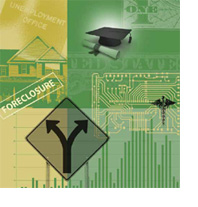UMass analysis documents widening inequality across the Bay State
Current economic recovery leaving many regions and residents behind
August 2011
 A new University of Massachusetts analysis released today finds that the Commonwealth's relatively robust economic recovery has not yet reached a large number of the Commonwealth's regions and residents and a decades long trend of widening economic inequality across the state has worsened notably in recent years.
A new University of Massachusetts analysis released today finds that the Commonwealth's relatively robust economic recovery has not yet reached a large number of the Commonwealth's regions and residents and a decades long trend of widening economic inequality across the state has worsened notably in recent years.
"Rising income inequality across Massachusetts reflects a divergence of the destinies of many Bay State families, communities, and regions," write UMass Professors Michael Goodman and Robert Nakosteen in their most recent analysis of the state of the state economy for MassBenchmarks, the journal of the Massachusetts economy published by the UMass Donahue Institute in collaboration with the Federal Reserve Bank of Boston. "While this pattern is by no means new, it is clear that recent events have served to exacerbate the inequality that has become a disturbing fact of life in the contemporary Massachusetts economy."
The analysis finds that:
- In real terms, incomes fell between 1999 and 2008 for families earning the 2008 state median of $81,258 or less.
- Since 1980 the ratio of the median income of the top fifth of Massachusetts families to the median income of the lowest fifth has grown by over 40 percent from just over 6 to nearly 8.6 to 1.
- The steepest rise in inequality has been in the Greater Boston region where, in 2008, the median family income in the top fifth of families was ten times that of their counterparts in the bottom fifth.
- In the Pioneer Valley and Berkshire regions, in real terms the median income of families in the lowest income quintile is now well below 1979 levels.
- The median family income in the highest income quintile in Greater Boston grew from $150,295 in 1979 to $232,879 in 2008, a real increase of 55 percent.
University of Massachusetts President Robert L. Caret said that education is key to addressing economic disparities. "Increasing education attainment and spreading the opportunity to benefit from the Bay State's global leadership in the innovation economy to our working families and communities outside Greater Boston will be critical to reversing these trends," he said. "The future economic and social health of the Commonwealth is dependent on that outcome."

